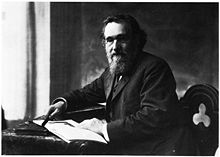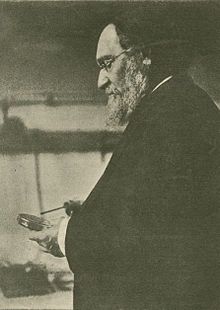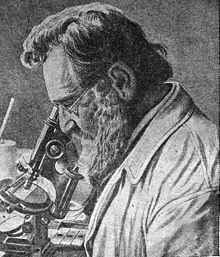- Élie Metchnikoff
-
Ilya Ilyich Mechnikov 
Born 15 May [O.S. 3 May] 1845
Ivanovka, Kharkov Governorate, Russian Empire (now Kupiansk Raion, Kharkiv Oblast, Ukraine)Died 15 July 1916 (aged 71)
Paris, FranceNationality  Russian
RussianFields Zoopathology, Immunology, Gerontology Alma mater Kharkov University
University of Giessen
University of Göttingen
Munich AcademyKnown for phagocytosis Notable awards Nobel Prize in Medicine (1908) Ilya Ilyich Mechnikov (Russian: Илья́ Ильи́ч Ме́чников, Ukrainian: Ілля Ілліч Мечников, also seen as Élie Metchnikoff) (15 May [O.S. 3 May] 1845 – 15 July 1916) was a Russian [1] biologist, zoologist and protozoologist, best remembered for his pioneering research into the immune system. Mechnikov received the Nobel Prize in Medicine in 1908, shared with Paul Ehrlich, for his work on phagocytosis. He is also credited by some sources with coining the term gerontology in 1903, for the emerging study of aging and longevity.
Contents
Early years
Mechnikov was born in a village near Kharkiv, Ukraine, the youngest son of Ilya Mechnikov, a Guard officer, and Emilia Mechnikova (née Nevakhovich). His maternal grandfather Lev Nevakhovich was the first Russo-Jewish writer and founder of the Haskala movement in Russia. The family name Mechnikov is a translation from Romanian, since his father was a descendant of the Chancellor Yuri Stefanovich, the grandson of Nicolae Milescu. The word "mech" is a Ukrainian translation of the Romanian "spadă" (sword), which originated with Spătar. His elder brother Lev became a prominent geographer and sociologist. Mechnikov developed a passion for natural history. When Charles Darwin's The Origin of Species was published, Ilya vehemently undertook the survival of the fittest, testing and teaching it.
He attended Kharkiv University where he studied natural sciences, completing his four-year degree in two years. He then went to Germany to study marine fauna on the small North Sea island of Heligoland and then at the University of Giessen, University of Göttingen and then at Munich Academy. In 1867 he returned to Russia to the appointment of docent at the new Odesa University, followed by an appointment at the University of St. Petersburg. In 1870 he returned to Odessa to take up the appointment of Titular Professor of Zoology and Comparative Anatomy.
Research
 Ilya Ilyich Mechnikov, by Nadar.
Ilya Ilyich Mechnikov, by Nadar.
Mechnikov became interested in the study of microbes, and especially the immune system. In 1882 he resigned his position at Odesa University and set up a private laboratory at Messina to study comparative embryology, where he discovered phagocytosis after experimenting on the larvae of starfish. He realised that the process of digestion in micro-organisms was essentially the same as that carried out by white blood cells. His theory, that certain white blood cells could engulf and destroy harmful bodies such as bacteria, met with scepticism from leading specialists including Louis Pasteur, Behring and others. At the time most bacteriologists believed that white blood cells ingested pathogens and then spread them further through the body.
Mechnikov returned to Odesa as director of an institute set up to carry out Pasteur's vaccine against rabies, but due to some difficulties left in 1888 and went to Paris to seek Pasteur's advice. Pasteur gave him an appointment at the Pasteur Institute, where he remained for the rest of his life.
Mechnikov's work on phagocytes won him the Nobel Prize in 1908.[2] He worked with Émile Roux on calomel, an ointment to prevent people from contracting syphilis, a sexually transmitted disease.
Mechnikov also developed a theory that aging is caused by toxic bacteria in the gut and that lactic acid could prolong life. Based on this theory, he drank sour milk every day. He wrote three books: Immunity in Infectious Diseases, The Nature of Man, and The Prolongation of Life: Optimistic Studies, the last of which, along with Metchnikoff's studies into the potential life-lengthening properties of lactic acid bacteria (Lactobacillus delbrueckii subsp. bulgaricus), inspired Japanese scientist Minoru Shirota to begin investigating the causal relationship between bacteria and good intestinal health, which eventually led to the worldwide marketing of Kefir and other fermented milk drinks, or probiotics.
Personal life
Mechnikov was married to his first wife Ludmila Feodorovitch in 1863. She died from tuberculosis on 20 April 1873. Her death, combined with other problems, caused Mechnikov to unsuccessfully attempt suicide, taking a large dose of opium. He married again in 1875, to Olga Belokopytova who died in 1944 in Paris from typhoid. Mechnikov died in 1916 in Paris from heart failure.
Further reading
- Microbe Hunters, by Paul De Kruif (1926)
- Deutsch, Ronald M. The Nuts Among the Berries. New York, Ballantine Books, rev. ed. 1967
- Schmalstieg, Frank C; Goldman Armond S (May. 2008). "Ilya Ilich Metchnikoff (1845-1915) and Paul Ehrlich (1854-1915): the centennial of the 1908 Nobel Prize in Physiology or Medicine". Journal of Medical Biography (England) 16 (2): 96–103. doi:10.1258/jmb.2008.008006. PMID 18463079.
- Breathnach, C S (September 1984). "Biographical sketches--No. 44. Metchnikoff". Irish medical journal (Ireland) 77 (9): 303. ISSN 0332-3102. PMID 6384135.
- Karnovsky, M L (May. 1981). "Metchnikoff in Messina: a century of studies on phagocytosis". N. Engl. J. Med. (UNITED STATES) 304 (19): 1178–80. doi:10.1056/NEJM198105073041923. ISSN 0028-4793. PMID 7012622.
- Lavrova, L N (September 1970). "[I. I. Mechnikov and the significance of his legacy for the development of Soviet science (on the 125th anniversary of his birth)]". Zh. Mikrobiol. Epidemiol. Immunobiol. (USSR) 47 (9): 3–5. ISSN 0372-9311. PMID 4932822.
References
- ^ "Metchnikoff | Definition of Metchnikoff at Dictionary.com". Dictionary.reference.com. http://dictionary.reference.com/browse/metchnikoff. Retrieved 13 November 2011.
- ^ "The Nobel Prize in Physiology or Medicine 1908 Ilya Mechnikov, Paul Ehrlich". Nobelprize.org. http://nobelprize.org/nobel_prizes/medicine/laureates/1908/. Retrieved 5 July 2010.
- Microbe Hunters, by Paul De Kruif (1926)
- Schmalstieg, Frank C; Goldman Armond S (May. 2008). "Ilya Ilich Metchnikoff (1845-1915) and Paul Ehrlich (1854-1915): the centennial of the 1908 Nobel Prize in Physiology or Medicine". Journal of Medical Biography (England) 16 (2): 96–103. doi:10.1258/jmb.2008.008006. PMID 18463079.
- Breathnach, C S (September 1984). "Biographical sketches--No. 44. Metchnikoff". Irish medical journal (IRELAND) 77 (9): 303. ISSN 0332-3102. PMID 6384135.
- Karnovsky, M L (May. 1981). "Metchnikoff in Messina: a century of studies on phagocytosis". N. Engl. J. Med. (UNITED STATES) 304 (19): 1178–80. doi:10.1056/NEJM198105073041923. ISSN 0028-4793. PMID 7012622.
- Lavrova, L N (September 1970). "I. I. Mechnikov and the significance of his legacy for the development of Soviet science (on the 125th anniversary of his birth)". Zh. Mikrobiol. Epidemiol. Immunobiol. (USSR) 47 (9): 3–5. ISSN 0372-9311. PMID 4932822.
- Tauber, A. I. and Chernyak, L. (1991) Metchnikoff and the Origins of Immunology. New York, Oxford University Press.
- Gourko, H., Williamson, DI. and Tauber, AI. (2000) The Evolutionary Biology Papers of Elie Metchnikoff. Dordrecht: Kluwer Academic Publishers.
- Tauber, AI. (2003) "Metchnikoff and the phagocytosis theory," Nature Reviews, Molecular Cell Biology. 4:897-901.
External links
- Nobel Prize biography
- The Romantic Rationalist: A Study Of Elie Metchnikoff
- Books written by I.I.Mechnikov (In Russian)
- Lactobacillus bulgaricus on the web
Nobel Laureates in Physiology or Medicine (1901–1925) Emil Behring (1901) · Ronald Ross (1902) · Niels Finsen (1903) · Ivan Pavlov (1904) · Robert Koch (1905) · Camillo Golgi / Santiago Ramón y Cajal (1906) · Alphonse Laveran (1907) · Élie Metchnikoff / Paul Ehrlich (1908) · Emil Kocher (1909) · Albrecht Kossel (1910) · Allvar Gullstrand (1911) · Alexis Carrel (1912) · Charles Richet (1913) · Robert Bárány (1914) · Jules Bordet (1919) · August Krogh (1920) · Archibald Hill / Otto Meyerhof (1922) · Frederick Banting / John Macleod (1923) · Willem Einthoven (1924)
Complete list · (1901–1925) · (1926–1950) · (1951–1975) · (1976–2000) · (2001–2025) Categories:- Ukrainian scientists
- Ukrainian inventors
- Ukrainian Nobel laureates
- Immunologists
- Nobel laureates in Physiology or Medicine
- Recipients of the Copley Medal
- Alumni of Kharkiv University
- University of Göttingen alumni
- Russian people of Ukrainian descent
- Ukrainian people of Romanian descent
- People from Kharkiv Oblast
- 1845 births
- 1916 deaths
- Foreign Members of the Royal Society
- Academy of Fine Arts, Munich alumni
Wikimedia Foundation. 2010.


